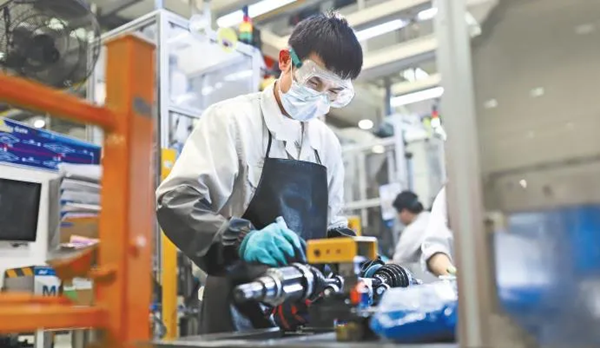

Workers wear masks, goggles and rubber gloves at work in the SDS Wuhan plant, on March 24. [Photo/official WeChat account of WHDZ]
The Wuhan plant of Shanghai GKN HUAYU Driveline Systems Co (SDS) has resumed work and production, according to the official WeChat account of the Wuhan Economic & Technological Development Zone (WHDZ).
According to WHDZ officials, currently there are 400 workers on the job. The plant can produce 8,000 automobile drive shafts annually and its production level is currently 35-40 percent of its previous capacity.
SDS is one of the earliest foreign-invested joint venture companies established in China for automotive components.
SDS has 10 factories in six places in China, with a market share of over 45 percent.
Among them, the Wuhan plant located in the WHDZ has an annual output of more than 8 million drive shafts which can equip 4 million cars, making it the largest drive shaft factory in China.
In 2019, China produced 25 million cars, which means that for every six new cars produced in China, one uses a "Made in Wuhan" drive shaft.
The plant’s products are supplied to more than 45 Chinese original equipment manufacturers including SAIC-GM, SAIC-Volkswagen, GAC Toyota, FAW-Volkswagen, Great Wall Motors, Dongfeng Nissan and Volvo -- as well as being exported.
The plant accounts for about 15 percent of the domestic driveshaft market.
Affected by the novel coronavirus epidemic, the plant was shut down temporarily on Jan 21, which once put greater pressure on the domestic supply chain.
On Feb 22, in order to provide support for Jiangling Motor’s production of special virus-fighting negative pressure ambulances, the Wuhan plant temporarily recalled about 50 employees and resumed work on a small scale.
On March 11, the Wuhan plant got the green light to return to full by the WHDZ and it is currently returning to work in stages.
The plant has adopted strict epidemic prevention and control measures. When entering the factory, employees need to show their health codes, wash their hands with disinfectant and pass through a tent with an anti-virus spray. In the workshop, workers must wear masks, goggles and rubber gloves.